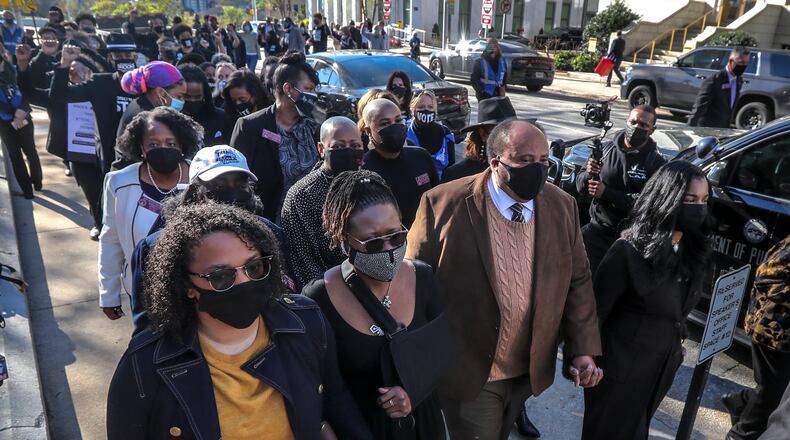Voting rights advocates ratcheted up the legal battle targeting Georgia’s new voting limitations with a second court challenge as critics rallied Monday around a state legislator who made a dramatic return to the state Capitol days after her arrest outside Gov. Brian Kemp’s office while protesting the changes.
Pushed to the defensive, state Republican leaders raced to counter a negative narrative about the far-ranging overhaul. Kemp scheduled interviews with conservative outlets declaring that opponents were grandstanding.
And Secretary of State Brad Raffensperger, under fire from fellow Republicans for defying calls to overturn former President Donald Trump’s defeat, told The Atlanta Journal-Constitution that the measure would “restore confidence” in the vote.
The divide over the Republican-backed measure has only seemed to sharpen after Georgia became the first battleground state to pass a sweeping new elections law, motivated in part by Trump’s roughly 12,000-vote loss in the state to Joe Biden — and his falsehoods that systemic voter fraud factored into his defeat.
State and county elections officials have repeatedly said Georgia’s vote was accurate and secure, and lawsuits challenging the outcome failed at every level.
The law, signed by Kemp within an hour of the final legislative vote, makes many changes to Georgia elections, such as requiring more voter ID to cast an absentee ballot, limiting ballot drop boxes and allowing state takeovers of county election offices. And soon after it was signed, critics who vowed to contest the changes in court made good on their promise.
A trio of voting rights groups filed an initial legal challenge on Thursday, just hours after Kemp signed the measure into law. And a coalition of groups that includes the state chapter of the NAACP followed up late Sunday with a separate lawsuit that calls the law the “culmination of a concerted effort” to suppress voters of color after GOP defeats in November and January.
“Unable to stem the tide of these demographic changes or change the voting patterns of voters of color, these officials have resorted to attempting to suppress the vote of Black voters and other voters of color in order to maintain the tenuous hold that the Republican Party has in Georgia,” the lawsuit states.
‘A martyr?’
Outside the state Capitol, state Rep. Park Cannon and dozens of supporters in matching black T-shirts held a solemn march calling attention to both the voting law and her arrest.
State troopers arrested Cannon, a symbol of resistance surrounding Georgia’s election overhaul, on Thursday night after she knocked on Kemp’s private office door while he was announcing he had signed the bill into law.
Viral video footage of Cannon’s arrest became a political rallying cry for Democrats, including U.S. Sen. Raphael Warnock, who framed it as a desperate attempt to “squeeze the people out of their own democracy.”
According to a police report obtained Monday by the AJC, the arresting officer said the Jan. 6 insurrection at the U.S. Capitol was “in the back of my mind” as he took Cannon into custody, and that he was worried that other protesters would be “emboldened” to follow her lead.
Republicans cast Cannon’s arrest as a calculated ploy for attention.
“She wanted to make a scene and be arrested. I’m not mad at her. That’s her right as an individual,” said Senate Majority Leader Mike Dugan, who sponsored the election legislation. “But don’t make her a martyr when she got what she went down there to do.”
Democratic state Sen. Nan Orrock urged her colleagues to watch the footage of Cannon’s arrest and join her and “deplore the treatment that she received at the hands of Georgia state troopers.”
‘We’ll have to see’
Even as the fallout over the arrest grew, the state’s top election official rushed to defend the law Cannon was protesting.
Raffensperger has come under frequent attack by Republicans for debunking pro-Trump mythology about election fraud, and the former president last week backed U.S. Rep. Jody Hice, a GOP challenger in next year’s election, in hopes of ending the secretary of state’s political career.
In the interview, Raffensperger said he supports the wide-ranging changes even though they weaken his authority as the state’s top election official.
He praised most of the law, especially the requirement that absentee voters must submit a driver’s license, state ID number or other documentation, a different voter verification process than signature matching.
But Raffensperger found fault with a provision that gives legislators far more power in local election matters, removing him as chairman of the State Election Board and replacing him with an appointee of the General Assembly.
The law then allows the board to take over county election offices, with the authority to certify elections, decide polling places and rule on challenges to voter eligibility.
“We’ll have to see how this works,” Raffensperger said, adding that he’s worried it will result in much “finger pointing and no accountability of who’s actually making the decision, particularly if the decision doesn’t work out too well.”
Keep Reading
The Latest
Featured





